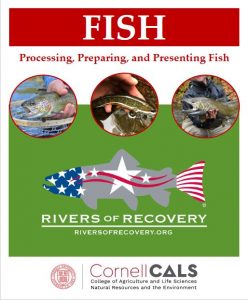The recently published “FISH: Processing, Preparing, and Presenting Fish” booklet is intended to augment a guided fishing outing with the basic information necessary to be able to successfully process, prepare, and present wild fish that are caught during an event. This booklet offers practical advice on preparing and consuming fish from stream to table based on the Wild Harvest Table program and Cornell Cooperative Extension research and outreach. The health and nutritional benefits of consuming fish are presented, along with recipes and tips for delicious preparation and presentation.
This guide is produced by Cornell University’s Department of Natural Resources and the Environment (WWRx Tidball Lab) and Wild Harvest Table in partnership with Seneca County Cornell Cooperative Extension, Rivers of Recovery, and Trout Unlimited.
In a recent WWRx study, veteran participants were asked if including wild fish and game processing, preparation and presentation skills in sponsored expeditions that support veterans would increase their satisfaction with those outings. 89% (139/156) responded that it would increase their satisfaction, with 70% saying it would greatly increase satisfaction. 90% agreed that “increasing my knowledge and skill in wild fish and game processing, preparation, and presentation would increase my feelings of satisfaction about being an outdoors person.”
There is a huge feeling of satisfaction that comes from procuring one’s own food from start to finish. There is also an ethical responsibility to be a good steward of what is harvested. Fish intended to be released should be handled gently, keeping hands and the fish wet during a quick release. Be sure to understand the conservation and management goals and conditions of a given fishery before deciding to keep fish for consumption.
Many of the techniques and recipes can be used with multiple species of fish. Only keep fish where it is responsible to do so. Always be sure to check your state’s fishing regulations for seasons and limits as well as any special health guidance.
Click here to download a free PDF of the booklet.
This work was supported by the USDA National Institute of Food and Agriculture, Multistate Hatch and Smith-Lever projects 2013-14-380: Returning Warriors II: A Study of the Social-Ecological Benefits of Coming Home to Nature and 2011-12-221: Returning Warriors: A Study of the Social-Ecological Benefits of Coming Home to Nature.






